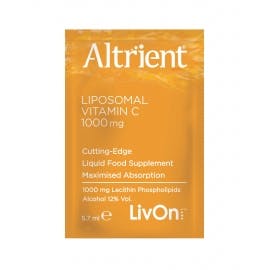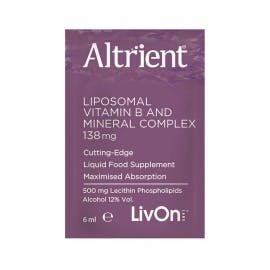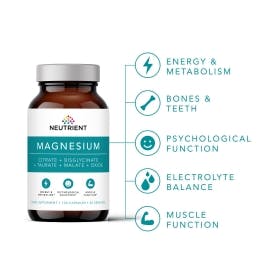Eating for Energy in Your 30's
Life in your 30’s generally means you’re through the mad partying of your 20’s and trying to further your career, or living with a partner and embarking on parenthood. That’s not to say that you’re not still enjoying a busy social life but, it could be less about late night clubbing and more about dinner dates, celebratory events and family planning. Even so, fitting everything in around a busy work schedule can be tricky and invariably leaves no time to focus on self-care. Sound familiar?
Keeping it all together should be reasonably easy for someone still enjoying the early glow of youth, but the strong healthy body you have in your 30’s won’t stay that way if you don’t look after it. Chances are your busy lifestyle may be affecting your sleep, energy levels and the food choices you make, which will eventually take its toll.
The Blood Sugar Rollercoaster
When energy is flagging, quick sugary snacks, processed foods and lots of caffeinated drinks are often the crutches people use to keep up the momentum, and therein lies the problem. High sugar foods and coffee are great for quick boosts of energy but inevitably they lead to blood sugar crashes. Lethargy and brain fog quickly set in while your body tries to muster up some more glucose to keep you going, sending you straight back to the biscuit tin! Blood sugar yo-yoing is not the best formula for productive work, or motivation to keep up a busy lifestyle, so what can you do? The key to boundless energy is to follow these 5 golden rules.
1.Never Skip Meals!
Regular meals and healthy balanced nutrition can make a huge difference to your energy levels. For food to be converted into energy, your body needs a whole range of vitamins and minerals, particularly vitamin B1, B2, B5, B6, B12 and niacin as well as vitamin C and magnesium, which all contribute to normal energy metabolism, but unfortunately many people have diets that fall short of these vital nutrients. To get sufficient amounts of these pro-energy foods, factor in three meals a day to include:
- B Vitamins - Whole grains, seafood, lean meat, liver, poultry, eggs, dairy, leafy greens, legumes, nutritional yeast, seeds
- Vitamin C – Guava, papaya, bell peppers, strawberries, kiwi & citrus fruits, Brussels sprouts, broccoli, cauliflower, red cabbage, potatoes, tomatoes
- Magnesium – Green leafy vegetables, avocados, legumes, nuts, seeds, natto, oats, brown rice, tofu
The inclusion of foods containing vitamin B2, B5, B6, B12, niacin, folate, magnesium and vitamin C may also help to reduce tiredness and fatigue. Many of the above-mentioned foods are ideal sources of complex carbohydrates and high-quality proteins that ward off hunger pangs and provide a slow release of energy throughout the day preventing blood sugar dips.
Avoiding white, sugary, refined foods and choosing instead whole-grains, such as oats, corn, spelt, buckwheat, quinoa , barley, millet, wild rice and rye will help to ensure stable energy levels. Try using the following plate portion guide to maintain a healthy balanced eating plan.
Plate proportions for blood sugar balance
.png)
2.Prioritise Sleep
Energy levels can be tough to maintain and it is easy to get tired and irritable which is why a good night’s sleep is so important. This may seem obvious but many people have great difficulty sleeping. To encourage restful sleep, stay away from caffeinated products such as tea, coffee and alcohol especially in the evenings. These act as stimulants and can keep you awake for hours.
Make sure you have adequate curtains that block out the light. Avoid anything that might keep your mind busy like reading, watching TV or using electronic devices. If getting off to sleep is a problem, magnesium may help. Magnesium is known to contribute to normal muscle function and may support the relaxation of muscles to aid restful sleep.
3.Exercise Daily
It takes as little as 30 minutes a day of something as simple as walking to energise your body and mind. What’s more it may be easier to incorporate this into your daily routine than trying to schedule gym sessions at the crack of dawn or late in the evening.
Exercise reduces stress, improves your circulation, transports oxygen and nutrients around the body, lifts your mood, improves your sleep, protects your bones and gets your muscles working. You owe it to yourself to squeeze it in somewhere.
Why not start your day with a yoga session at home before breakfast or set your alarm and go out for a walk during your lunch break. You will see the almost immediate difference it makes to your mental and physical energy, setting you up for a productive day and lasting energy.
4.Hydrate
Dehydration can leave you feeling sluggish and unable to concentrate. It’s important to drink lots of fluid throughout the day. Water is ideal but herbal tea and de-caffeinated coffee can also add to your fluid intake. Fruit and vegetables also contain lots of water, not to mention other energy raising nutrients, so aim for 5 to 10 servings a day.
5. Supplement Wisely
Despite your best efforts, there may be times when you just can’t get the balance right and your diet may be less than perfect. Its at these times that supplements can help to bridge the gap. There’s no need to complicate things, three simple supplements are all you need:
- Neutrient Magnesium – this totally unique high strength formula contains 4 bioactive chelates offering optimised absorption that is gentle on the gut and fast acting.
- Altrient C – Gives you a high dose of vitamin C wrapped up in a double layered phospholipid liposome. The advantage of liposomal supplements is the use of ingenious technology to surround and protect nutrients on their journey through the digestive system, delivering the contents rapidly to the cells that need them.
- Altrient B – A liposomal vitamin B complex, contains the full range of B vitamins, complemented by other carefully chosen minerals and botanicals to enhance the formula, including chromium which helps to support blood glucose levels.
Written by: Jacqueline Newson BSc (Hons) Nutritional Therapy
Editor: Alejandra Toro, Pshychologist, MSc Nutrition and Behaviour






